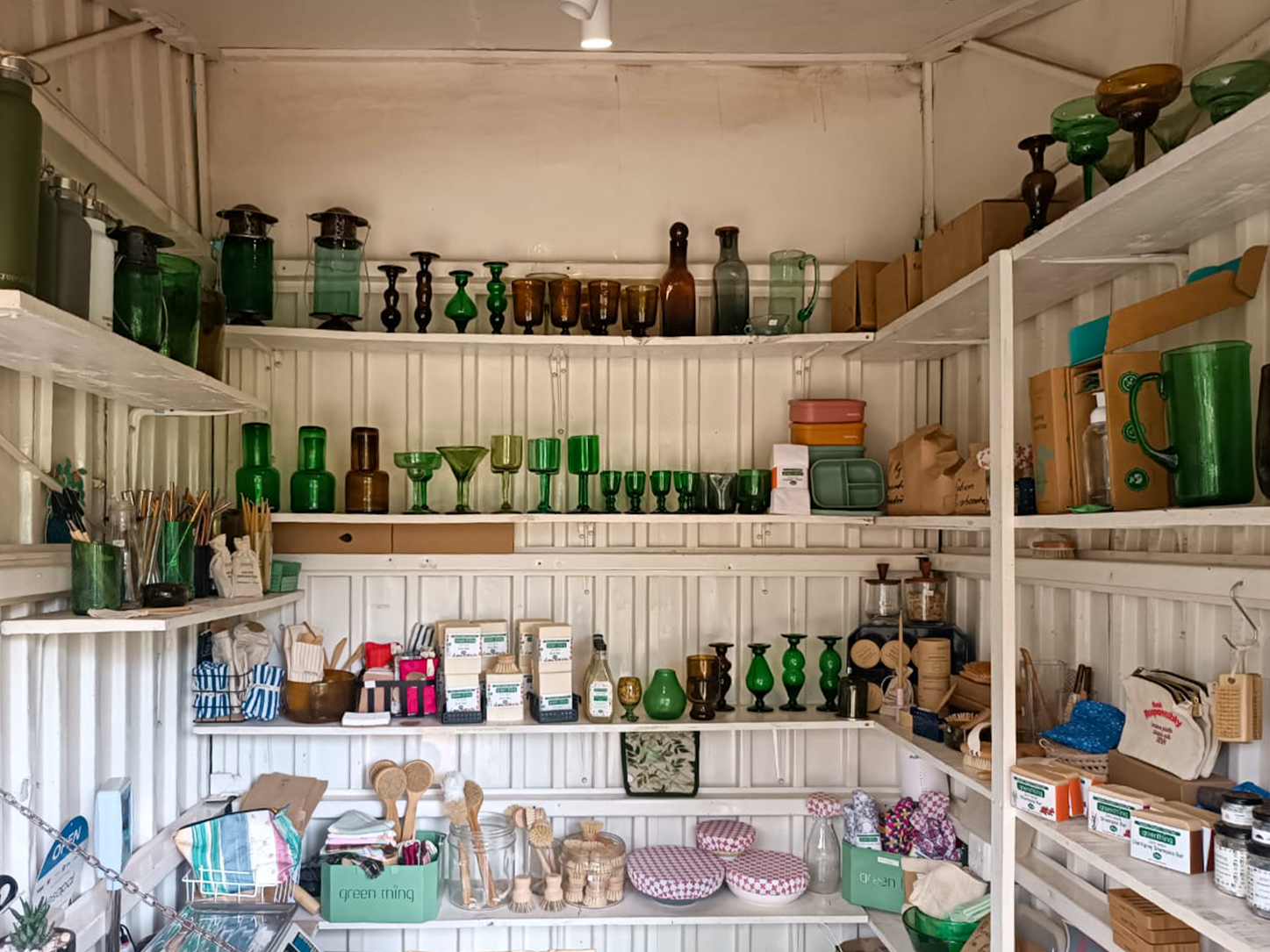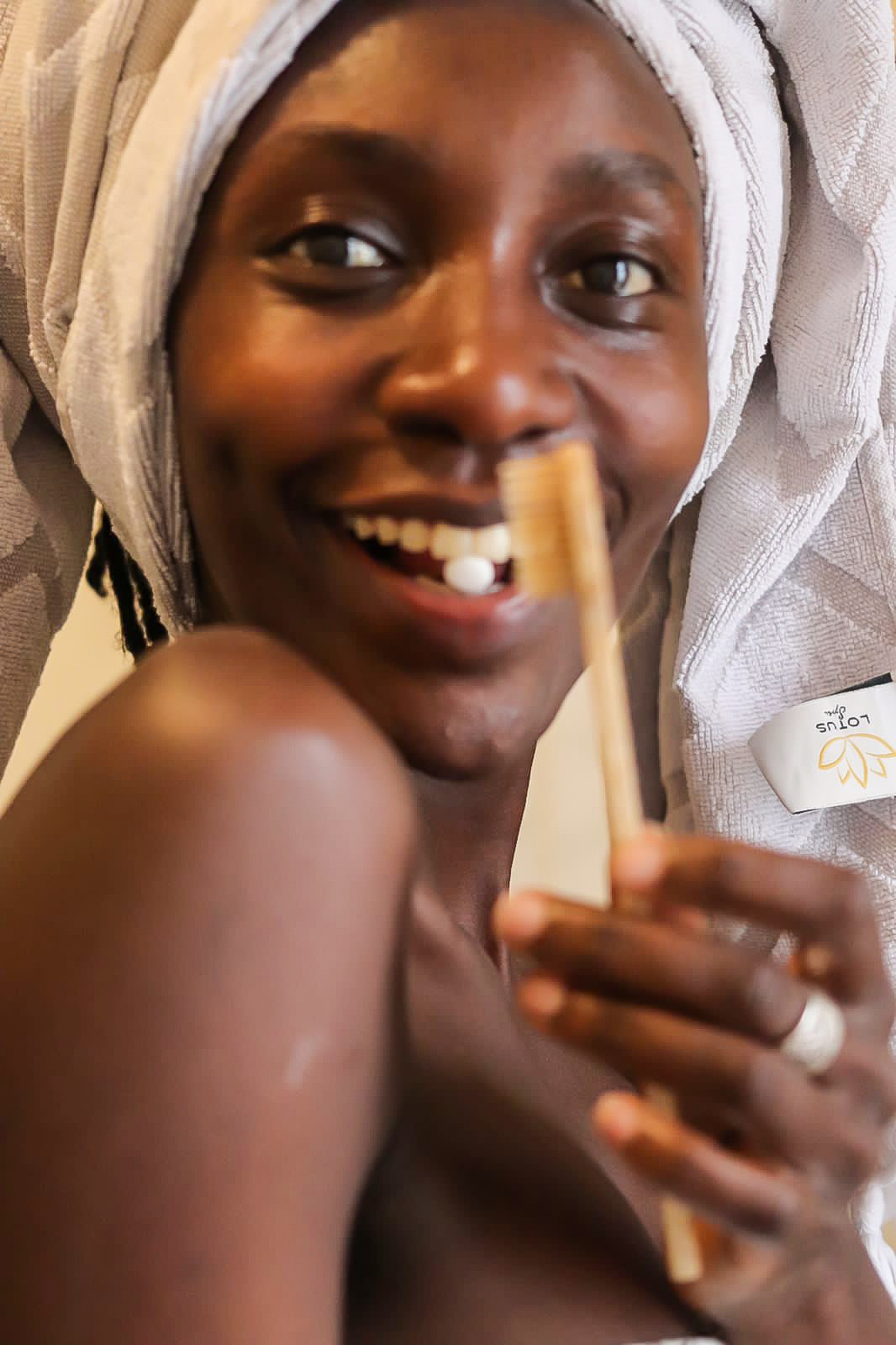Entering one of Nelly Gesare‘s eco-conscious retail stores is like walking into a world in transformation.
Glass bottles, once discarded as waste, are now sleek drinking tumblers and jars. Scraps of fabric, saved from landfills, have been stitched into desirable shopping bags and reusable dish sponges.
Every shelf tells a story—not of waste but of renewal. This is now the world of the former journalist who has turned the challenge of waste into a thriving business.
“I use Greenthing Kenya to tell the story of sustainability and the opportunities therein. My goal is to break down sustainability and show that it’s not just about the environment—it’s about a broader systemic shift,” she explained in an interview.
“We focus on eco-friendly home care, recycled materials, and sustainable textiles. Some of our work involves white-label manufacturing for other brands,” she added.
Greenthing Kenya is one of a number of upcycling brands that include Ecandi, EcoSafi, MokoMaya and others, that operate in Nairobi.
The rise of eco-brands in the region signals a growing consumer preference for sustainable products, according to Cynthia Atieno, a sustainability expert at the United Nations Environment Programme.
“It is incredibly encouraging to see brands like Greenthing Kenya gaining market success. It reaffirms that sustainability is not just a trend but a thriving market with real demand and long-term potential,” she explained.

The trend is also in expansion mode well beyond major cities like Nairobi.
Dennis Ondari, a 26-year-old entrepreneur from Kisii town, who has been running a glass bottle waste business since December 2024, cites the rising demand for eco-friendly products as “the biggest motivator” behind launching his venture there.
“Before starting ‘Chupa Zone’, I worked for an ecoproduct business in Nairobi for three years. I witnessed the growth; that is why I decided to replicate the model here,” he explained in a phone interview.
However, Gesare revealed that she did not set out to be a sustainability entrepreneur when she began her venture a decade ago.
“As a journalist, my primary goal was always to make information accessible and digestible—for both the general public and younger audiences,” she explained.
“Back in 2012, sustainability was still a very new concept. To raise awareness, I created a TV series and pitched it to media houses I had previously worked with. However, the challenge was that the content wasn’t being prioritised. That’s when I decided to take matters into my own hands.”
The journey was hardly uneventful. Her first business attempt included manufacturing reusable metallic straws, a venture that hit a roadblock when local production costs soared to an unsustainable 1,500 shillings (about 12 US dollars) per straw. But instead of giving up, she found a new way forward.
“A turning point came. I lost everything. With the little I had left, I launched a product—and it sold out in two days. That experience showed me the power of sustainability-driven business,” she explained.

Years later, Gesare has created not just an eco-brand for selling a range of products, but also a glowing example for like-minded individuals commited to turning waste into businesses can turn to. Hers is a model that not only helps clean up the environment but also empowers local communities.
The company works with women waste pickers, offering them fair wages while dignifying their role in the circular economy.
By formalising waste collection and providing financial stability to these workers, Gesare is proving that sustainability solutions must also be people-centered.
“My strength has always been in identifying people — finding the right talent and creating opportunities for them,” Gesare shared.
Today, Greenthing Kenya transforms discarded glass, fabric, and plastics into a diverse range of eco-friendly items, from biodegradable cleaning supplies to upcycled textiles like reusable dish sponges and makeup removers.
The company also operates a solar-powered stitching station, ensuring that even the production process aligns with its sustainability ethos.
“I have also recently set up a glass-blowing studio — the second of its kind in Kenya in 30 years, and the first ever owned by a Kenyan woman,” she added.
Gesare continues to expand her business, defying the formidable hurdles that African entrepreneurs — especially women — encounter, from securing funding to navigating global economic uncertainties.

“For many women in business, funding is often evaluated based on risk rather than potential. To this day, I have never received a grant. And yet, I’ve grown from a solo entrepreneur to employing more than ten full-time staff members,” she expressed.
The funding challenges that face women-led startups in Africa are pehaps best captured in a 2023 report by startup funding tracking organisation, Africa: The Big Deal.
According to the tracker, in 2023, startups with solo or all-female founders secured just 2.3% of total African startup funding. This rises to 15% for teams with at least one female founder.
This is despite Africa having the highest rate of female entrepreneurship globally, according to the African Development Bank.
A 2023 study by the Organisation for Economic Co-operation and Development found that more than a quarter of all businesses were either started or run by women.
By comparison, in Europe, entrepreneurial activity among women is just 5.7 percent, according to figures from the European Investment Bank.
Entrepreneurs like Gesare highlight the resilience of African women in business.
“I’m now diversifying my revenue streams through exports. As of this month, we’ve started exporting glass products,” she said.
Research by Development Reimagined suggests that between 1994 and 2021, global trade in environmental goods grew significantly, yet the distribution remains highly imbalanced. With China dominating with 17.3 percent of global exports. Africa contributes only 1 percent, with South Africa accounting for over half of that share, suggesting that Africa has plenty of untapped opportunities in the trade of eco-products.
Gesare’s product line serves as a testament to the viability of the industry domestically, with thousands of customers now choosing biodegradable over plastic, proving that business can be both profitable and responsible.
Greenthing Kenya’s current revenues are from three product categories: eco-friendly hotel products, eco-friendly home care products, and non-toxic cleaning products.

Some of its most popular products, such as glassware, received an overwhelmingly positive market response. In its first month of operation, the company generated over 200,000 shillings (more than 1,500 US dollars) in glass product sales. Today, it processes more than 4,000 bottles each month.
The company is now expanding beyond Kenya. Greenthing recently entered the export market, shipping glassware and eco-friendly home care products to international buyers. To sustain this growth, Gesare is collaborating with universities on cutting-edge sustainability research and investing in improved packaging to meet global standards.
For aspiring green entrepreneurs, her message is clear:
“You have it in you to make it possible. When one thing doesn’t work, it’s often a redirection to explore what you can do with the resources available to you.”
***
Story Credit: Bonface Oruche for Bird Story Agency

